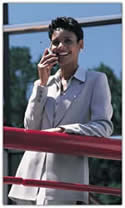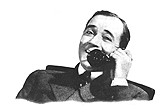Falando ao Telefone - Talking on the Telephone
Terminando a ligação - Finishing the calling

Leia a seguir o texto em inglês e logo abaixo a tradução para português.
If you made a mistake and dialed the wrong telephone number, the person you're talking to might say something like this:
- Sorry, I'm afraid you have the wrong number
or
- I'm sorry, but there is no one here by that name.
In that case, just say I'm sorry and try dialing the number you want again. Don't ask if you've dialed a certain number and especially don't ask WHICH number you've dialed. This is considered offensive and even provocative since you can easily obtain the person address by having just a phone number (and robe the house or make obscene phone calls etc.).
Assuming now that you've succeeded in dialing the right number and have spoken to the right person, you can end the conversation in a number of ways.
The most common thing to say is bye-bye or just bye (not good-bye, which is commonly used when you're speaking to someone in person but sound rather abrupt on the telephone). You can then say something like: see you later; take it easy; take care...
As we mentioned previously and as you may note, americans and britons are not openly affectionate people, and sending kisses and hugs over the phone is quite strange to them, especially to the men. With this in mind it's propably better to keep your closing comments as simple, brief and non-intimate as possible.
[Tradução do texto acima]
Se você se enganou e discou o número de telefone errado, a pessoa que lhe atender pode lhe dizer:
- Sorry, I'm afraid you have the wrong number. (Desculpe, que acho que você discou o número errado.)
ou
- I'm sorry, but there is no one here by that name. (Desculpe, mas aqui não tem ninguém com este nome.)
Neste caso, somente peça desculpas e tente discar novamente o número que deseja. Não pergunte se você discou determinado número e, principalmente, não pergunte QUAL número você discou. Isto é considerado ofensivo e mesmo provocativo visto que se pode facilmente obter o endereço da pessoa tendo-se somente um número de telefone (e assaltar casa ou fazer ligações obscenas, etc...)
Digamos que você tenha discado o número certo e tenha falado com a pessoa certa. Você pode agora terminar a conversa de diversas maneiras:
É mais comum falar bye-bye, ou somente bye (tchau) - não good-bye, que é comumente usado quando você está falando com alguém pessoalmente, mas ao telefone parece grosseiro. Você pode então falar algo como: see you later (até mais), take it easy, take care (se cuida)...
Conforme mencionamos anteriormente e como você deve ter observado, os americanos e britânicos não demonstram abertamente afeição, e mandar beijos e abraços pelo telefone é bastante estranho para eles, especialmente para os homens. Com isto em mente, talvez seja melhor tornar suas finalizações o mais simples, breves e impessoais possível.

Terminando |
Finishing |
Preciso desligar. |
Listen, I have to go. |
Então tá bom... |
OK, then... |
Gostei de falar com você. |
It was nice talking to you. |
Vamos marcar alguma coisa. |
But let's get together sometime... |
Um beijo./Um abraço.* |
Take care. |
Até mais. |
See you. |
Tchau. |
Bye. |
*Lembre-se! Em inglês não há nada semelhante a "um abraço" ou "um beijo", como costumamos no português nos despedir ao telefone de quem conhecemos. Um simples see you ou take care é suficiente nessa horas. Da mesma maneira, não há equivalente em inglês para "De onde fala?". Outra coisa é que o costume de pontuar a conversa com "eh", "ahan" e sons parecidos para mostrar que você está ouvindo fica muito estranho em inglês. Em geral, a despedida ao telefone em inglês é de fato muito breve.





























